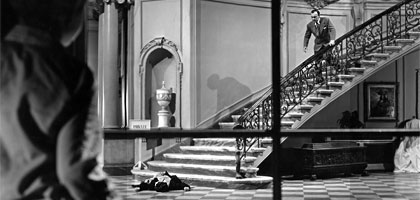Primary navigation


Philip Kemp on the underrated centrepiece of Carol Reed's trio of post-war classics
Alexander Korda had something of a genius for teaming up creative personnel. Having matched Michael Powell with Emeric Pressburger, he then introduced Graham Greene to Carol Reed. The director, who had just quit Rank after being subjected to penny-pinching quibbles over Odd Man Out (1947), was delighted by the idea; he and Greene had admired each other's work for years, though they'd never met. The rapport was immediate. Greene later described Reed as "the only director, really, that I've enjoyed working with." He particularly enjoyed their first collaboration, The Fallen Idol (1948), saying it was "more a writer's film than a director's".
Even so, Greene initially thought that the short story Korda had chosen for adaptation, 'The Basement Room', was unfilmable, since it included "a murder committed by the most sympathetic character and an unhappy ending." Reed persuaded him that the outcome could be changed and Greene happily went along with the alteration. Which is odd, since it's the ending of The Fallen Idol (a title, incidentally, chosen by the distributor and loathed by Greene) that rings most false.
The centrepiece of the great trio of films directed by Reed at the height of his career, The Fallen Idol has suffered neglect in recent years, its quiet murmur drowned out by the melodramatic reverberations of its predecessor and successor, Odd Man Out and The Third Man (1949). The other two are both public films, each played out in full view on the stage of a politically divided city, and photographed by Robert Krasker, master of skewed angles and dramatic shadows. By comparison, The Fallen Idol, shot by the cooler, more fluid Georges Périnal, is chamber-music film-making scaled to a domestic arena.
Exterior locations apart, almost all the film is set in the formal, comfortless expanses of a huge London embassy. Reed makes masterly use of this vertiginous space right from the opening: the ambassador's neglected eight-year-old son, Phillipe, peers down from the uppermost landing at the servants as they are presided over by the boy's idol, Baines the butler, and move like chess pieces over the checkered hallway below. Staircases - the grandiose double curve of the interior, the jagged outside fire-escape, the intimate basement stairway leading down to Baines' pantry - define the film's emotional boundaries, offering vantage points for spying eyes but also unreliable perspectives. When Phillipe, fleeing in panic from the confrontation between Baines and his shrewish wife, scrambles down the fire-escape, his intermittent glimpses from outside as he passes each window lead him crucially to misread the sequence of events.
This key scene encapsulates the film's themes of secrets and lies, perception, loyalty and betrayal. Alert to everything around him, Phillipe lacks the emotional maturity to make sense of events; he sees what's going on, but misinterprets its meaning. And the lies he tells, intended to protect Baines, only serve to deepen the suspicions of the police. Greene said: "The subject no longer concerned a small boy who unwittingly betrayed his best friend to the police, but dealt instead with a small boy who believed that his friend was a murderer and nearly procured his arrest by telling lies in his defence."
It's interesting that Greene misremembers his own story. In 'The Basement Room' his young protagonist, tired of all the lies and secrets, deliberately betrays his friend. "He was going to finish once and for all with everything, with Baines and Mrs Baines and the grown-up life beyond him." By doing so, Greene implies, he blights his own life for ever, "extricat[ing] himself from life, from love, from Baines with a merciless egotism." Such a devastating conclusion might indeed have been too much for cinema audiences. But the alternative tragic irony towards which the film's narrative logic seems to be heading - Baines arrested for murder as a result of the boy's well-meant lies - would surely have worked better than the fudge we get. The police decide much too readily, on the basis of one ambiguous piece of evidence, that Baines is innocent and dismiss Phillipe's testimony out of hand.
This letdown may explain why The Fallen Idol has never stood as high in critical esteem as Odd Man Out or The Third Man . But up to that point Idol is a supremely controlled piece of film-making that not even William Alwyn's heavy-handed score can disrupt. Above all, it shows Reed's consummate skill as a director of actors. Michael Redgrave described him as "the gentlest of directors... able, with infinite pains and care, to bestow on his actors the feeling that everything was up to them and that all he was doing was to make sure that they were seen to their best advantage". His direction of Ralph Richardson and the young Bobby Henrey (who had never acted before) has been rightly praised, but his handling of Sonia Dresdel as Mrs Baines is almost more remarkable, bringing out the desperate loneliness beneath her spite, the frustration of a woman whose husband has long since abandoned her for his private fantasy world.
Born in Putney, the illegitimate son of actor-manager Sir Herbert Beerbohm Tree, Carol Reed entered the acting profession in 1924. After working as assistant to crime novelist Edgar Wallace at British Lion, he moved in 1932 to Ealing Studios, where he directed his debut feature 'Midshipman Easy' in 1935.
Versatile and unfailingly workmanlike, Reed went on to make a mixed bag of movies, which ranged from social drama ('Bank Holiday', 1938) to screwball comedy ('Climbing High', 1939). His first major film, 'The Stars Look Down' (1939), adapted from a novel by A.J. Cronin, brought grim documentary authenticity to its pit-head scenes. Having established himself as a major figure in the British film industry, Reed then directed one of the best wartime propaganda films, 'The Way Ahead' (1944).
After the war he hit his stride with a trio of films - 'Odd Man Out' (1947), 'The Fallen Idol' (1948) and 'The Third Man' (1949) - that earned him the status of Britain's finest director. But then he seemed to lose his way.
A Conrad adaptation, 'Outcast of the Islands' (1951), proved a disappointment, and 'The Man Between' (1953) felt like a tired retread of 'The Third Man'.
The rest of his career represented a sad decline, with sentimental whimsy ('A Kid for Two Farthings', 1954) and routine thrillers ('The Running Man', 1963) interspersed with overblown international tosh ('Trapeze', 1956; 'The Agony and the Ecstasy', 1965). Only twice was there something of a return to form: 'Our Man in Havana' (1959) reunited Reed with Graham Greene in a stylish, sardonic spy comedy; and a stack of Academy Awards, including a best-director Oscar, greeted 'Oliver!' (1968).